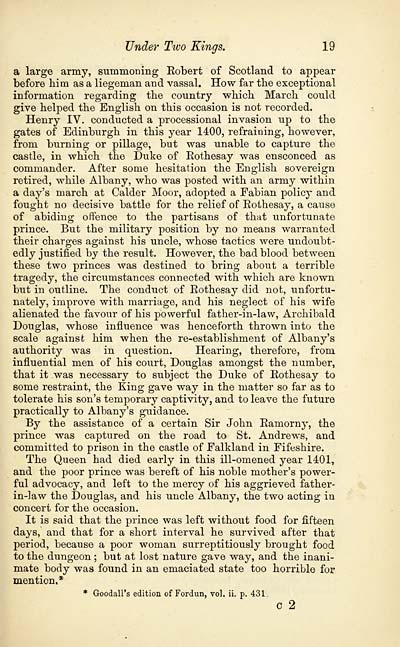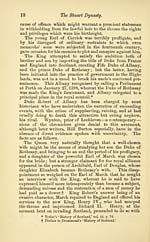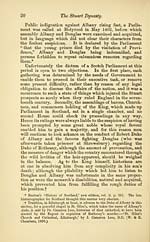Stuart dynasty
(39) Page 19
Download files
Complete book:
Individual page:
Thumbnail gallery: Grid view | List view

Under Two Kings. 19
a large army, summoning Eobert of Scotland to appear
before him as a liegeman and vassal. How far the exceptional
information regarding the country which March could
give helped the English on this occasion is not recorded.
Henry IV. conducted a processional invasion up to the
gates of Edinburgh in this year 1400, refraining, however,
from burning or pillage, but was unable to capture the
castle, in which the Duke of Eothesay was ensconced as
commander. After some hesitation the English sovereign
retired, while Albany, who was posted with an army within
a day's march at Calder Moor, adopted a Fabian policy and
fought no decisive battle for the relief of Eothesay, a cause
of abiding offence to the partisans of that unfortunate
prince. But the military position by no means warranted
their charges against his uncle, whose tactics were undoubt-
edly justified by the result. However, the bad blood between
these two princes was destined to bring about a terrible
tragedy, the circumstances connected with which are known
but in outline. The conduct of Eothesay did not, unfortu-
nately, improve with marriage, and his neglect of his wife
alienated the favour of his powerful father-in-law, Archibald
Douglas, whose influence was henceforth thrown into the
scale against him when the re-establishment of Albany's
authority was in question. Hearing, therefore, from
influential men of his court, Douglas amongst the number,
that it was necessary to subject the Duke of Eothesay to
some restraint, the King gave way in the matter so far as to
tolerate his son's temporary captivity, and to leave the future
practically to Albany's guidance.
By the assistance of a certain Sir John Eamorny, the
prince was captured on the road to St. Andrews, and
committed to prison in the castle of Falkland in Fifeshire.
The Queen had died early in this ill-omened year 1401,
and the poor prince was bereft of his noble mother's power-
ful advocacy, and left to the mercy of his aggrieved father-
in-law the Douglas, and his uncle Albany, the two acting in
concert for the occasion.
It is said that the prince was left without food for fifteen
days, and that for a short interval he survived after that
period, because a poor woman surreptitiously brought food
to the dungeon ; but at lost nature gave way, and the inani-
mate body was found in an emaciated state too horrible for
mention.*
* Goodall's edition of Fordun, vol. ii. p. 431.
c 2
a large army, summoning Eobert of Scotland to appear
before him as a liegeman and vassal. How far the exceptional
information regarding the country which March could
give helped the English on this occasion is not recorded.
Henry IV. conducted a processional invasion up to the
gates of Edinburgh in this year 1400, refraining, however,
from burning or pillage, but was unable to capture the
castle, in which the Duke of Eothesay was ensconced as
commander. After some hesitation the English sovereign
retired, while Albany, who was posted with an army within
a day's march at Calder Moor, adopted a Fabian policy and
fought no decisive battle for the relief of Eothesay, a cause
of abiding offence to the partisans of that unfortunate
prince. But the military position by no means warranted
their charges against his uncle, whose tactics were undoubt-
edly justified by the result. However, the bad blood between
these two princes was destined to bring about a terrible
tragedy, the circumstances connected with which are known
but in outline. The conduct of Eothesay did not, unfortu-
nately, improve with marriage, and his neglect of his wife
alienated the favour of his powerful father-in-law, Archibald
Douglas, whose influence was henceforth thrown into the
scale against him when the re-establishment of Albany's
authority was in question. Hearing, therefore, from
influential men of his court, Douglas amongst the number,
that it was necessary to subject the Duke of Eothesay to
some restraint, the King gave way in the matter so far as to
tolerate his son's temporary captivity, and to leave the future
practically to Albany's guidance.
By the assistance of a certain Sir John Eamorny, the
prince was captured on the road to St. Andrews, and
committed to prison in the castle of Falkland in Fifeshire.
The Queen had died early in this ill-omened year 1401,
and the poor prince was bereft of his noble mother's power-
ful advocacy, and left to the mercy of his aggrieved father-
in-law the Douglas, and his uncle Albany, the two acting in
concert for the occasion.
It is said that the prince was left without food for fifteen
days, and that for a short interval he survived after that
period, because a poor woman surreptitiously brought food
to the dungeon ; but at lost nature gave way, and the inani-
mate body was found in an emaciated state too horrible for
mention.*
* Goodall's edition of Fordun, vol. ii. p. 431.
c 2
Set display mode to:
![]() Universal Viewer |
Universal Viewer | ![]() Mirador |
Large image | Transcription
Mirador |
Large image | Transcription
Images and transcriptions on this page, including medium image downloads, may be used under the Creative Commons Attribution 4.0 International Licence unless otherwise stated. ![]()
| Histories of Scottish families > Stuart dynasty > (39) Page 19 |
|---|
| Permanent URL | https://digital.nls.uk/94818234 |
|---|
| Description | A selection of almost 400 printed items relating to the history of Scottish families, mostly dating from the 19th and early 20th centuries. Includes memoirs, genealogies and clan histories, with a few produced by emigrant families. The earliest family history goes back to AD 916. |
|---|

